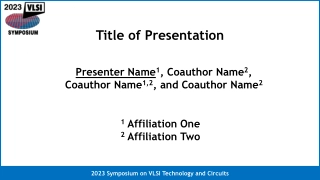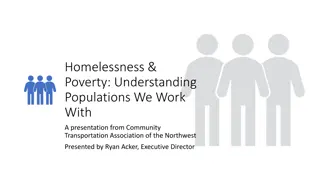The Shaping of a New Generation: Early Career Researchers at the University-Community Interface
Relationship dynamics between universities and society are evolving, impacting the nature of intellectual labor. This study focuses on the experiences of Early Career Researchers (ECRs) navigating collaborative research, interdisciplinary work, and internal labor relations. The Connected Communities Programme in the UK serves as a flagship research initiative emphasizing community involvement and interdisciplinary collaboration. Research design involves interviews, focus groups, and case studies to explore ECR experiences, interactions, and employment conditions.
- Generation shaping
- Early career researchers
- University-community interface
- Interdisciplinary collaboration
- Connected Communities
Download Presentation

Please find below an Image/Link to download the presentation.
The content on the website is provided AS IS for your information and personal use only. It may not be sold, licensed, or shared on other websites without obtaining consent from the author. Download presentation by click this link. If you encounter any issues during the download, it is possible that the publisher has removed the file from their server.
E N D
Presentation Transcript
The shaping of a new generation? The shaping of a new generation? Early career researchers working at the interface between universities and communities Dr. Bryony Enright Prof. Keri Facer Dr. Lisa Lucus Graduate School of Education, University of Bristol
Context and Objectives Relationship between university and society is changing: Third mission , knowledge exchange , civic universities Nature of intellectual labour is changing: New forms of accountability, economic austerity demanding useful knowledge, and academic legitimacy New processes of knowledge production: Collaborative, co-produced trans and interdisciplinary gaining popularity ECRs at the sharp end of renegotiations of relationships between: 1) Collaborative research: Universities and their publics (Mahony, 2013; Jongbloed et al, 2013; Strier, 2014) 2) Interdisciplinarity: Relationships between disciplines (Barry & Born, 2013; Strathern, 2006) 3) Internal labour relations: Relationships between universities and their staff (Nadolny and Ryan, 2013; Dowling, 2008; Martin 2011) bryony.enright@bristol.ac.uk
Connected Communities Programme Flagship UK research programme Keri Facer; Leadership Fellow, Bryony Enright; PDRA on fellowship Researching community with by and for communities Interdisciplinary (strong A&H element) & Collaborative (early stage involvement of communities in research design, data collection, analysis) Running since 2010 Invested over 20m in over 300 projects, will continue to 2018 Over 400 academics and 650 community partners involved Employing roughly 150 ECRs bryony.enright@bristol.ac.uk
Research Design 17 ECRs (defined as less than eight years experience in academic research) 11 in-depth semi-structured interviews Focus group with 6 ECRs Within context of 40 Semi-structured Interviews with academics and 25 community partners (to date) Interview themes relating to life narrative; intellectual labour; interactions with non-academic collaborators; employment conditions Questionnaire survey of over 100 projects and community collaborators (to date) Detailed case studies of 3 projects with different models of co-production bryony.enright@bristol.ac.uk
Research Questions Who are the researchers taking on these roles in complex conditions and what experience and knowledge do they bring to the research practice? What is the nature of the intellectual and practical work that ECRs are carrying out on interdisciplinary and collaborative projects in the CC programme? How/do employment conditions, intellectual work and relationships with external partners inter-relate in the experiences of these ECRs? bryony.enright@bristol.ac.uk
ECR research participants 11 women 6 men; mid-20s to early-40s All but one on fixed-term contracts Varying combinations of part-time contracts, from 0.2FTE to full-time, from three months to six years 6 ECRs concurrently working on PhD 11 ECRs with previous careers outside academia, e.g. Health professionals, designers, gallery assistants and work in policy Often bringing in personal and professional networks to the projects bryony.enright@bristol.ac.uk
What are the ECRs doing? Everything Roles: Research Assistant/Associate; Teaching Assistant; Engagement and Impact Officer; Project Officer; Lecturer; Senior Research Fellow; PhD Student Activities: Bringing in partners through existing contacts; recruiting participants from scratch; running events; writing newspapers and new forms of dissemination; financial management of the projects; designing methodological approaches; data analysis; final report writing; writing the bids (and not getting named as Co-Is) Central role to the success of the projects: the core delivery team , You are the project bryony.enright@bristol.ac.uk
That group of five [ECRs and artists], that seems to be something quite special there... And that s the core delivery team on the project. So, in a sense [the PI] and [other Co-I] and I and [the other community partners] are all busy doing lots of other things; that project s success or failure is based around that group of five... I think they re really creative, they bring very different ideas and qualities, I find with any of these projects that you re bought out for 10% of your time say for something, but in a sense, for the project to really work it s those early career researchers that actually make the difference. (Historian, Co-I) bryony.enright@bristol.ac.uk
ECR roles in interdisciplinary and collaborative research Translating and demystifying conceptual underpinning to non- academic audiences, participants and across disciplines Facilitating informed consent and attempting to enable voice and democratisation building trust and friendships Discussing with collaborators what universities are for, what research is and the nature of academic labour - explaining the competing logics of interdisciplinary and collaborative research Being reflexive about their position within the academy and wider perception of academics bryony.enright@bristol.ac.uk
I feel like a lot of what Ive been doing has been like, kind of, translation across the different sectors and different partnerships, and I feel like my role as an ECR has been quite critical in brokering those relationships. (Natalie, ECR) You also need to be able to communicate with the [group of vulnerable people they are working with] to demystify it, do you know what I mean? You know they re scared to, you know, if they re meeting a professor and you know they don t quite know what the study means, what we re trying to get out of it and what s required of them. And I guess just putting them at ease and trying to do that in a way that you can demystifyit I suppose. I d like to think that would be the skills that I possibly bring. (Stuart, ECR) bryony.enright@bristol.ac.uk
Living with Precarity Interesting and exciting work Diverse orientations (sometimes in the same person) toward precarity (Standing, 2013) grinners (arts/creative industries background, precarity as default, arts as experiment, approach from personal development perspective) seeing this as an exciting experience, allows autonomy and maintenance of other identities groaners anxiety about part time and short term nature of contracts, constant need to apply for new jobs, unrecognised for contribution, gripping the table at Christmas, not knowing if the contract will be renewed. NB for many the motivation in the work is making a difference , the economic does not come first. Particular risks associated with collaborative and interdisciplinary work bryony.enright@bristol.ac.uk
Different approaches to building security amongst ECRs Freelance model Don t rely on university as employer Disciplinarian - Strong eye on discipline Create your own university Generate your own income stream Work hard, head down Try and get written into other projects bryony.enright@bristol.ac.uk
Discussion These conditions are creating a generation of researchers who are growing up collaborative in which fractional, distributed working practices that engage diverse forms and sources of knowledge, are normal. There are risks for this group if teaching and institutional structures only favour the disciplinarian , then they may find themselves excluded from the academy once the funding dries up but this group also has other networks and resources that are open to them Is there, however, a real opportunity for this group to collaborate and build security for themselves by recognising and demonstrating their centrality to research enterprise (academic, public and industrial) ? They are the project in interdisciplinary and collaborative research. The precariat in academic labour is different from other forms of labour because it is not exchangeable. It has huge latent power because the intellectual labour is embodied in the ECRs, in their networks, friendships, trust and insights that they have developed through these projects. What would happen if that labour was withdrawn or simply taken outside the academy? bryony.enright@bristol.ac.uk
Thank You Keri.facer@bristol.ac.uk Bryony.enright@bristol.ac.uk Lisa.Lucas@Bristol.ac.uk www.connected-communities.org bryony.enright@bristol.ac.uk























